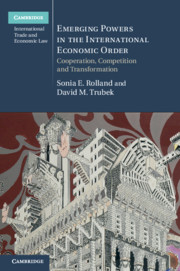Book contents
- Emerging Powers in the International Economic Order
- Cambridge International Trade and Economic Law
- Emerging Powers in the International Economic Order
- Copyright page
- Contents
- Tables
- Preface
- Table of Treaties and Conventions
- Table of Cases
- WTO Cases
- Abbreviations
- 1 Introduction
- 2 Cooperation Narratives and Theoretical Divergences
- 3 Developing Countries’ Love–Hate Relationship with Neoliberalism
- 4 Seeking a New Balance of Rights and Obligations in International Investment Law
- 5 Emerging Economies, Developmental Strategies and Trade Standards: the Search for Alternative Space
- 6 Emerging Economies and the Future of the Global Trade and Investment Regime
- Bibliography
- Government Sources
- Index
5 - Emerging Economies, Developmental Strategies and Trade Standards: the Search for Alternative Space
Published online by Cambridge University Press: 22 July 2019
- Emerging Powers in the International Economic Order
- Cambridge International Trade and Economic Law
- Emerging Powers in the International Economic Order
- Copyright page
- Contents
- Tables
- Preface
- Table of Treaties and Conventions
- Table of Cases
- WTO Cases
- Abbreviations
- 1 Introduction
- 2 Cooperation Narratives and Theoretical Divergences
- 3 Developing Countries’ Love–Hate Relationship with Neoliberalism
- 4 Seeking a New Balance of Rights and Obligations in International Investment Law
- 5 Emerging Economies, Developmental Strategies and Trade Standards: the Search for Alternative Space
- 6 Emerging Economies and the Future of the Global Trade and Investment Regime
- Bibliography
- Government Sources
- Index
Summary
This chapter examines whether and to what extent emerging countries may be able to engage in alternative approaches to trade regulation among themselves and in their relations to developed economies. It shows that liberal orthodoxy is in retrenchment. It documents the reservations that many emerging powers have about the neoliberal approach, and shows the conflict between some trade rules and state-led development strategies (“developmentalism”). In some areas, emerging powers are resisting liberalization pressures by ignoring certain existing rules, refusing to agree to others, and seeking to create alternative orderings with more flexible standards. However, there is not always consensus within key countries about trade and development policy. They have differences on many aspects of liberalization, and there are limits to their capacity to create alternative economic spaces. While resistance from the South and rising protectionism in the North have stalled the liberalization drive, leaving trade law more open to developmentalism for now, the South has not developed the kind of strong ideological consensus and strategic coordination needed to fundamentally alter the trade regime. Countries are guided by pragmatism and divergent national interests.
Keywords
- Type
- Chapter
- Information
- Emerging Powers in the International Economic OrderCooperation, Competition and Transformation, pp. 136 - 186Publisher: Cambridge University PressPrint publication year: 2019

